1992 VOLKSWAGEN CARAVELLE brake
[x] Cancel search: brakePage 78 of 164
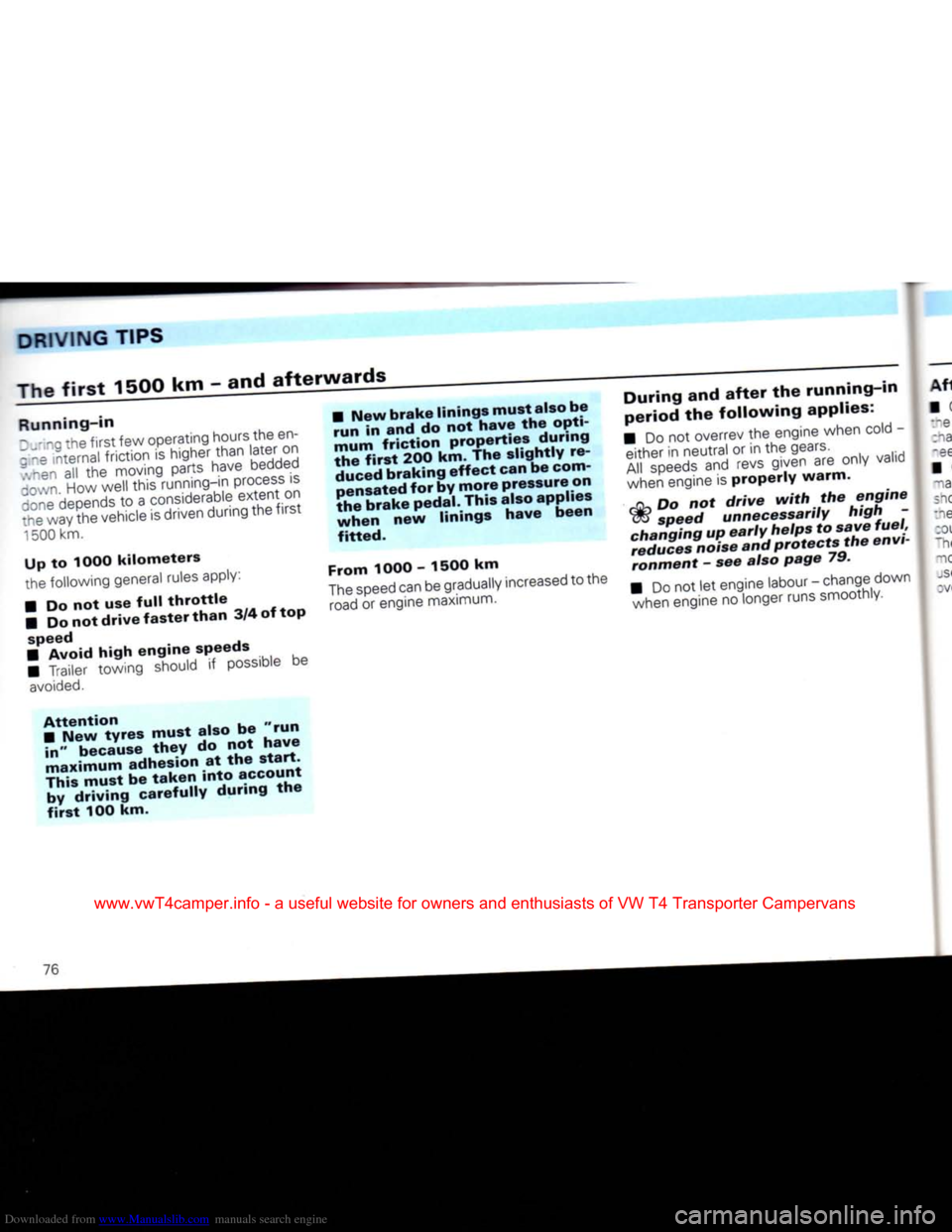
Downloaded from www.Manualslib.com manuals search engine
DRIVING
TIPS
The
first
1500 km - and
afterwards
Running-in
I/-c :he
first
few operating hours the en-
5ine
internal friction is higher than later on .-.hen all the moving parts have bedded
down.
How well this running-in process is
::cne
depends to a considerable extent on
the way the vehicle is driven during the
first
1500
km.
Up to 1000
kilometers
the following general rules apply:
• Do not use
full
throttle
• Do not
drive
faster
than
3/4 of top speed
• Avoid
high
engine
speeds
• Trailer towing should if possible be
avoided.
Attention
• New
tyres
must
also be "run in" because
they
do not
have
maximum
adhesion at the
start.
This
must
be
taken
into
account by
driving
carefully
during
the
first
100 km. • New
brake
linings
must
also be
run in and do not
have
the opti
mum
friction
properties
during
the
first
200 km. The
slightly
re duced
braking
effect
can be com
pensated
for by
more
pressure on
the
brake
pedal. This also applies
when
new linings
have
been
fitted.
From 1000 - 1500 km
The
speed can be gradually increased to the road or engine maximum.
During
and
after
the
running-in
period
the
following
applies:
• Do not overrev the engine when cold - either in neutral or in the gears.
All
speeds and revs given are only valid
when engine is
properly
warm.
Do not
drive
with
the
engine
speed
unnecessarily
high
changing
up
early
helps
to
save
fuel,
reduces
noise
and
protects
the
envi
ronment
- see
also
page
79.
• Do not let engine labour - change down when engine no longer runs smoothly.
76
www.vwT4camper.info - a useful website for owners and enthusiasts of VW T4 Transporter Campervans
Page 80 of 164
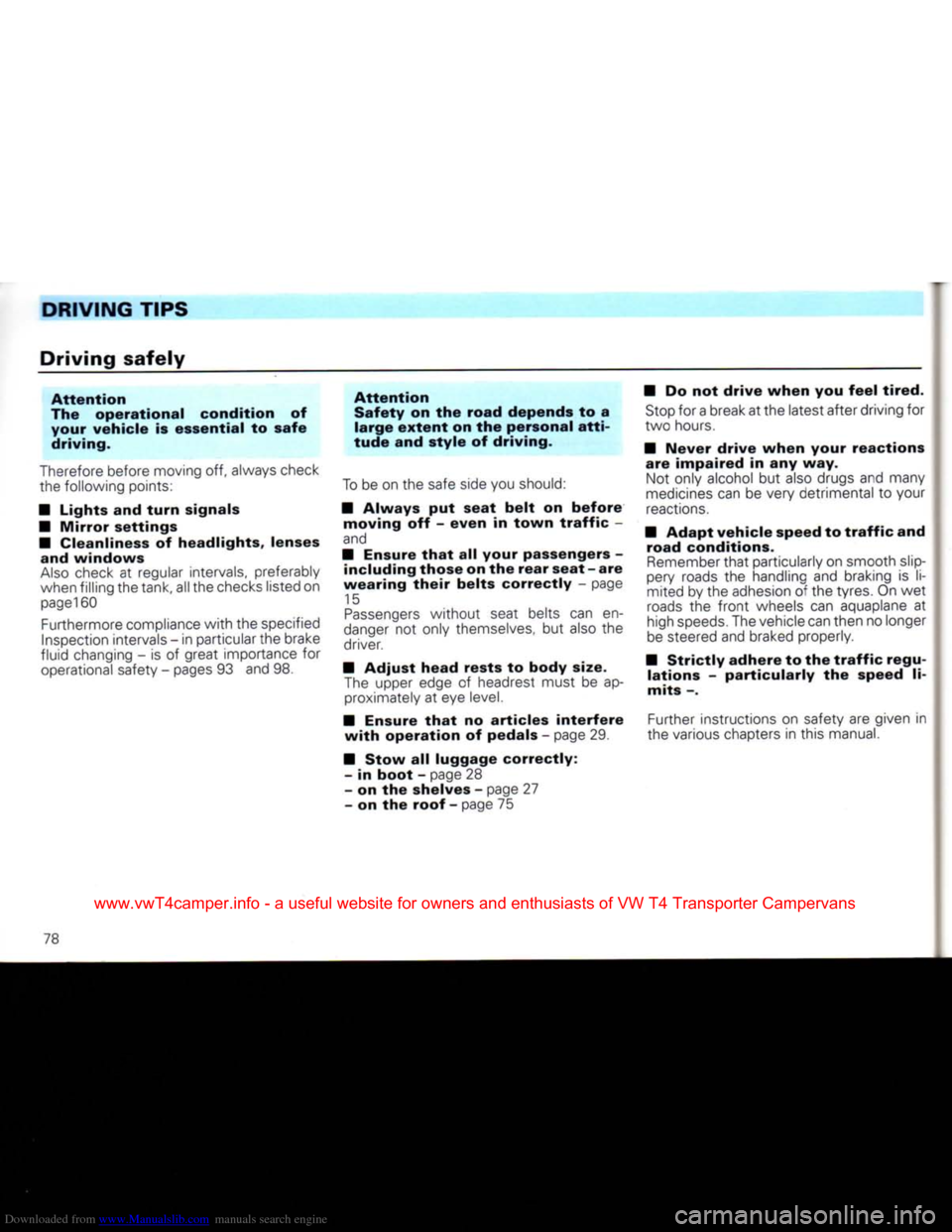
Downloaded from www.Manualslib.com manuals search engine
DRIVING
TIPS
Driving
safely
Attention
The
operational
condition of your
vehicle
is
essential
to
safe
driving.
Therefore before moving off, always check
the following points:
• Lights and
turn
signals
•
Mirror
settings
• Cleanliness of
headlights,
lenses and
windows
Also
check at regular intervals, preferably
when filling the tank, all the checks listed on
page160
Furthermore compliance
with
the specified Inspection intervals - in particular the brake
fluid changing - is of great importance for operational safety - pages 93 and 98.
Attention
Safety
on the
road
depends to a
large
extent
on the personal
atti
tude
and
style
of driving.
To
be on the safe side you should:
•
Always
put
seat
belt
on
before
moving
off -
even
in
town
traffic
-
and
• Ensure
that
all your passengers - including
those
on the
rear
seat
- are
wearing
their
belts
correctly
- page
15
Passengers
without seat belts can en
danger
not only themselves, but also the
driver.
•
Adjust
head
rests
to body size.
The
upper edge of headrest must be approximately at eye
level.
• Ensure
that
no
articles
interfere
with
operation
of pedals - page 29
•
Stow
all
luggage
correctly:
- in
boot
- page 28
- on the shelves - page 27
- on the
roof
- page 75 • Do not
drive
when
you
feel
tired.
Stop
for a break at the latest after driving for
two hours.
•
Never
drive
when
your
reactions
are
impaired
in any way. Not only alcohol but also drugs and many
medicines
can be very detrimental to your
reactions.
•
Adapt
vehicle
speed to
traffic
and
road
conditions.
Remember
that
particularly on smooth slip
pery roads the handling and braking is li
mited by the adhesion of the tyres. On wet
roads
the
front
wheels can aquaplane at
high
speeds.
The vehicle can then no longer
be
steered and braked properly.
•
Strictly
adhere
to the
traffic
regu
lations
-
particularly
the speed li
mits
-.
Further instructions on safety are given in
the various chapters in this manual.
78
www.vwT4camper.info - a useful website for owners and enthusiasts of VW T4 Transporter Campervans
Page 81 of 164
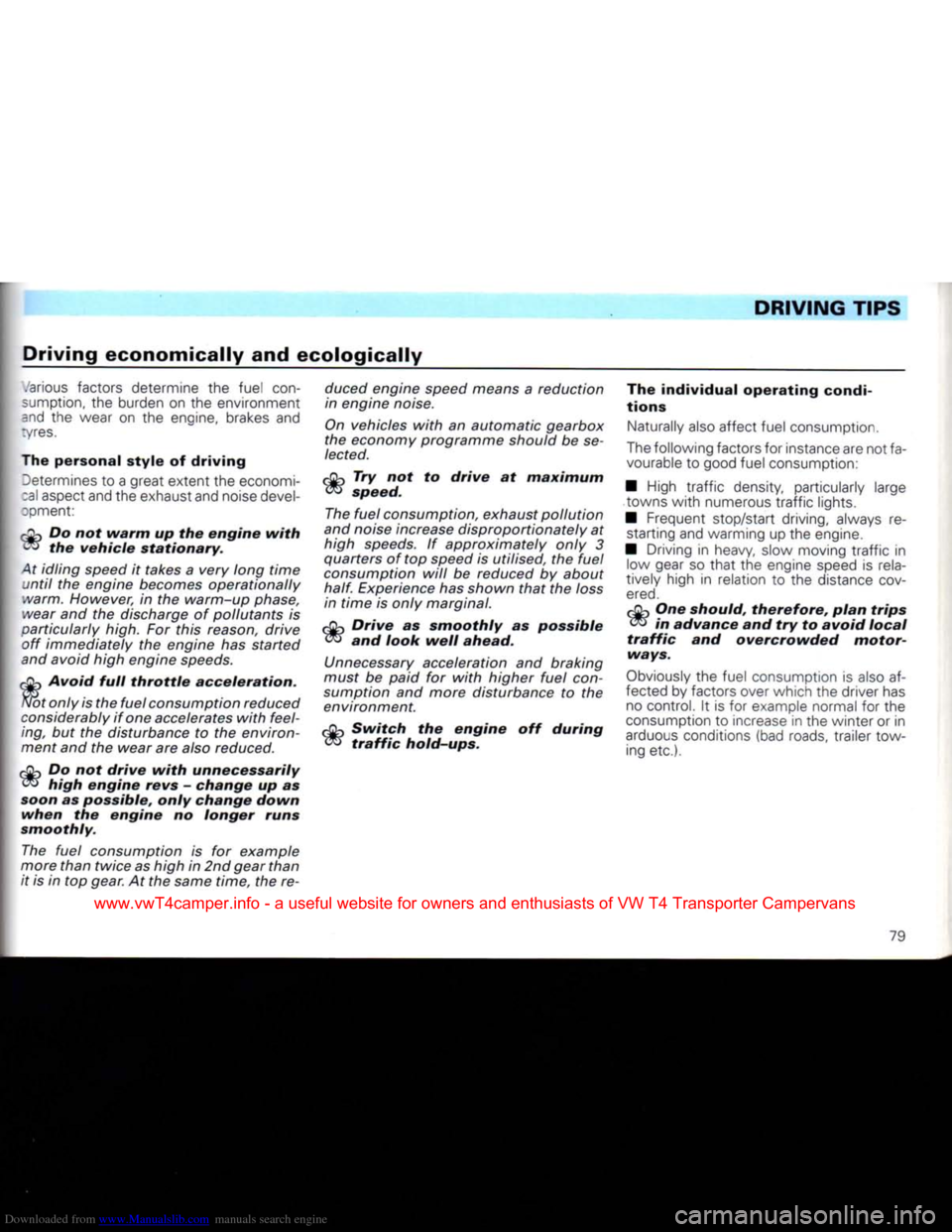
Downloaded from www.Manualslib.com manuals search engine
DRIVING
TIPS
Driving economically and ecologically
.'arious
factors determine the fuel
con
sumption,
the burden on the environment
and
the wear on the engine, brakes and
lyres.
The personal style of driving
Determines
to a great extent the economi-
:al
aspect and the exhaust and noise
devel
opment:
jOp
Do not
warm
up the
engine
with
W» the
vehicle
stationary.
At idling speed it takes a very long
time
until
the engine becomes operationally
warm. However, in the warm-up phase,
wear and the discharge of pollutants is
oarticularly high. For
this
reason, drive
off immediately the engine has started
and avoid
high
engine speeds.
f
h Avoid
full
throttle
acceleration.
of only is the
fuel
consumption reduced
considerably
if one accelerates
with
feel
ing, but the disturbance to the environ
ment
and the wear are also reduced.
rflri
Do not
drive
with
unnecessarily
high
engine
revs
-
change
up as
soon as possible,
only
change
down
when
the
engine
no
longer
runs
smoothly.
The
fuel
consumption is for example
more
than
twice as
high
in 2nd gear
than
it is in top
gear.
At the same
time,
the re duced engine speed means a reduction
in engine noise.
On vehicles
with
an automatic gearbox
the economy programme should be se
lected.
c^p
Try not to
drive
at
maximum
TO
speed.
The
fuel
consumption, exhaust pollution
and noise increase disproportionately at
high
speeds. If approximately only 3
quarters of top speed is utilised, the
fuel
consumption
will
be reduced by about
half.
Experience has shown
that
the loss in
time
is only marginal.
c
j-,
Drive
as
smoothly
as possible and
look
well
ahead.
Unnecessary
acceleration and braking
must
be paid for
with
higher
fuel
con
sumption and more disturbance to the environment.
Switch
the
engine
off
during
hold-ups. The individual
operating
condi
tions
Naturally
also
affect fuel consumption.
The
following factors for instance are not fa
vourable
to good fuel consumption:
•
High traffic density, particularly large
.towns with numerous traffic lights.
•
Frequent stop/start driving, always restarting and warming up the engine.
•
Driving in heavy, slow moving traffic in
low
gear so that the engine speed is
rela
tively high in relation to the distance cov
ered.
CQ~, One
should,
therefore,
plan
trips
in
advance
and try to
avoid
local
traffic
and
overcrowded
motor
ways.
Obviously
the fuel consumption is
also
af
fected
by factors over which the driver has
no
control. It is for example normal for the
consumption
to increase in the winter or in
arduous
conditions (bad roads, trailer tow ing etc.).
79
www.vwT4camper.info - a useful website for owners and enthusiasts of VW T4 Transporter Campervans
Page 83 of 164
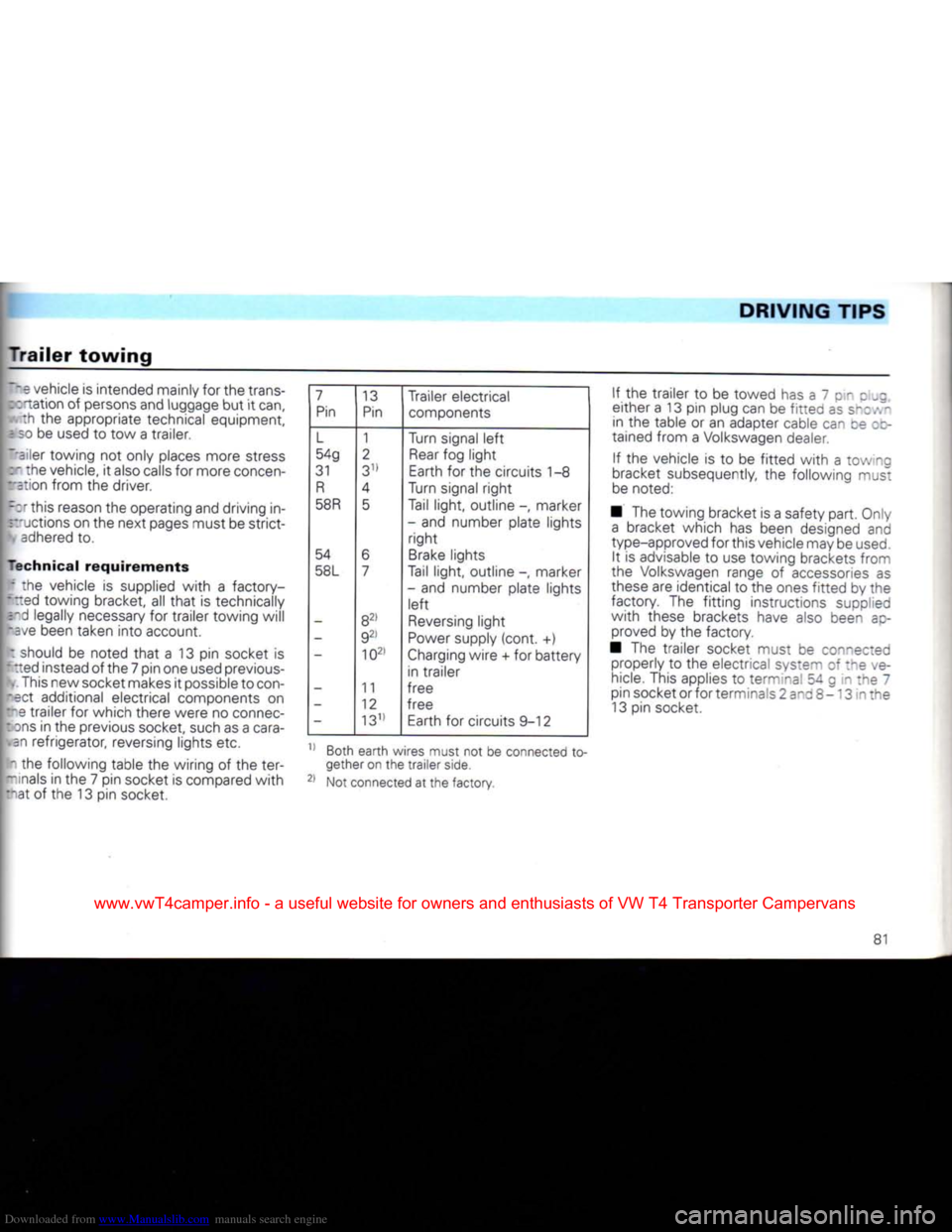
Downloaded from www.Manualslib.com manuals search engine
DRIVING
TIPS
Trailer
towing
~~e
vehicle is intended mainly for the trans-
cctation of persons and luggage but it can, th the appropriate technical equipment,
=
so be used to tow a trailer.
Ibiler towing not only places more stress : - the vehicle, it also calls for more concen-
ration from the driver.
::r this reason the operating and driving inductions on the next pages must be strict- . adhered to.
Technical
requirements
" :he vehicle is supplied
with
a factory-
• ::ed towing bracket, all
that
is technically -
d
legally necessary for trailer towing will =ve been taken into account.
: should be noted
that
a 13 pin socket is
::ed
instead of the 7 pin one used previous- . This new socket makes it possible to con-
ect additional electrical components on trailer for which there were no connec-
ns
in the previous socket, such as a
cara-
n refrigerator, reversing lights etc.
the following table the wiring of the ter-
nals
in the 7 pin socket is compared
with
at of the 13 pin socket.
I a 7
13
Trailer electrical
Pin Pin
components
L
1 Turn signal
left
54g
2
Rear
fog light
31
311
Earth
for the circuits 1-8
R
4
Turn signal
right
58
R
5
Tail
light, outline -, marker
- and number plate lights
right
54 6
Brake
lights
58L
7
Tail
light, outline -, marker
- and number plate lights
left
- 82>
Reversing
light
-
92!
Power
supply (cont. +)
-
102!
Charging
wire + for battery
in trailer
- 11
free
- 12
free
-
1311
Earth
for circuits 9-12
1) Both earth wires must not be connected to gether on the trailer side.
21 Not connected at the factory. If the trailer to be towed has a 7 pin plug,
either a 13 pin plug can be
fitted
as shown
in the table or an adapter cable can ce zz-
tained from a Volkswagen dealer.
If the vehicle is to be
fitted
with
a towing
bracket subsequently, the following must
be
noted:
• The towing bracket is a safety part. Only
a
bracket which has been designed and
type-approved for this vehicle may be
used.
It is advisable to use towing brackets from
the Volkswagen range of accessories as
these
are identical to the ones
fitted
by the
factory. The
fitting
instructions supplied
with
these brackets have also been ap proved by the factory.
• The trailer socket must be connected properly to the electrical system of the ve
hicle.
This applies to terminal 54 g in the 7
pin socket or for terminals 2 and 8 -13 in the
13
pin socket.
81
www.vwT4camper.info - a useful website for owners and enthusiasts of VW T4 Transporter Campervans
Page 85 of 164

Downloaded from www.Manualslib.com manuals search engine
DRIVING
TIPS
• Where possible make
full
use of the maximum permissible drawbar weight on
call
of the towing bracket - see page 151 -
cut do not exceed it.
• While observing the permissible trailer
and
drawbar weight, distribute the load in
the trailer so
that
heavy objects are as near
as
possible to the axle. The objects must
a
so be secured so
that
they cannot slip
aoout.
• Check the
tyre
pressures on the towing
/ehicle
and the trailer.
• The headlight settings, should be
:hecked
with
trailer attached before mov- ng off and adjusted as necessary.
On
vehicles
with
headlight beam control it
is
only necessary to
turn
the knurled disc in
:ash
in the appropriate direction.
Driving
instructions
To
obtain the best possible handling of ve
hicle
and trailer, the following should be
noted:
• Try to avoid driving
with
an unladen ve
hicle
and a loaded trailer. If this cannot be
avoided,
only drive slowly to allow for the unfavourable weight distribution.
• As driving stability of vehicle and trailer
decreases
when the speed increases do not
drive at the maximum permissible top
speed
in unfavourable road, weather or
wind conditions - particularly when going downhill. In any
case
the speed must be reduced im
mediately the trailer shows the slightest
sign
of snaking. On no account try to stop
the snaking by accelerating.
• For safety reasons one should not drive faster than 80 km/h (50 mph). This also
applies
in countries where higher speeds
are permitted. • Always brake in good time. If the trailer
has
an overrun brake, apply the brakes gen
tly at
first
then firmly. This will avoid the
jerk
ing caused by the trailer wheels locking.
Change
down before going down a steep hill so
that
the engine can act as a brake.
• When a long climb in a low gear
with
ex tremely high engine revs must be nego
tiated at exceptionally high ambient temperatures the coolant temperature gauge must be observed. When the gauge needle
moves
to the
>~zza'
e~z of :ne
scale,
the road speed must be reduced immediately. If nevertheless ~g amp flashes,
stop immediately and si ow the engine to
cool
off at idling speed for several minutes.
• The cooling effect of the radiator fan
can
not be increased by changing down, be
cause
the speec of t~e
~a~
s ~o! dependent
on the engine
speed.
One should therefore not change down even when towing a
trailer as long as :-e e-g -e zar cope with out the vehicle speed dropping too much.
83
www.vwT4camper.info - a useful website for owners and enthusiasts of VW T4 Transporter Campervans
Page 93 of 164
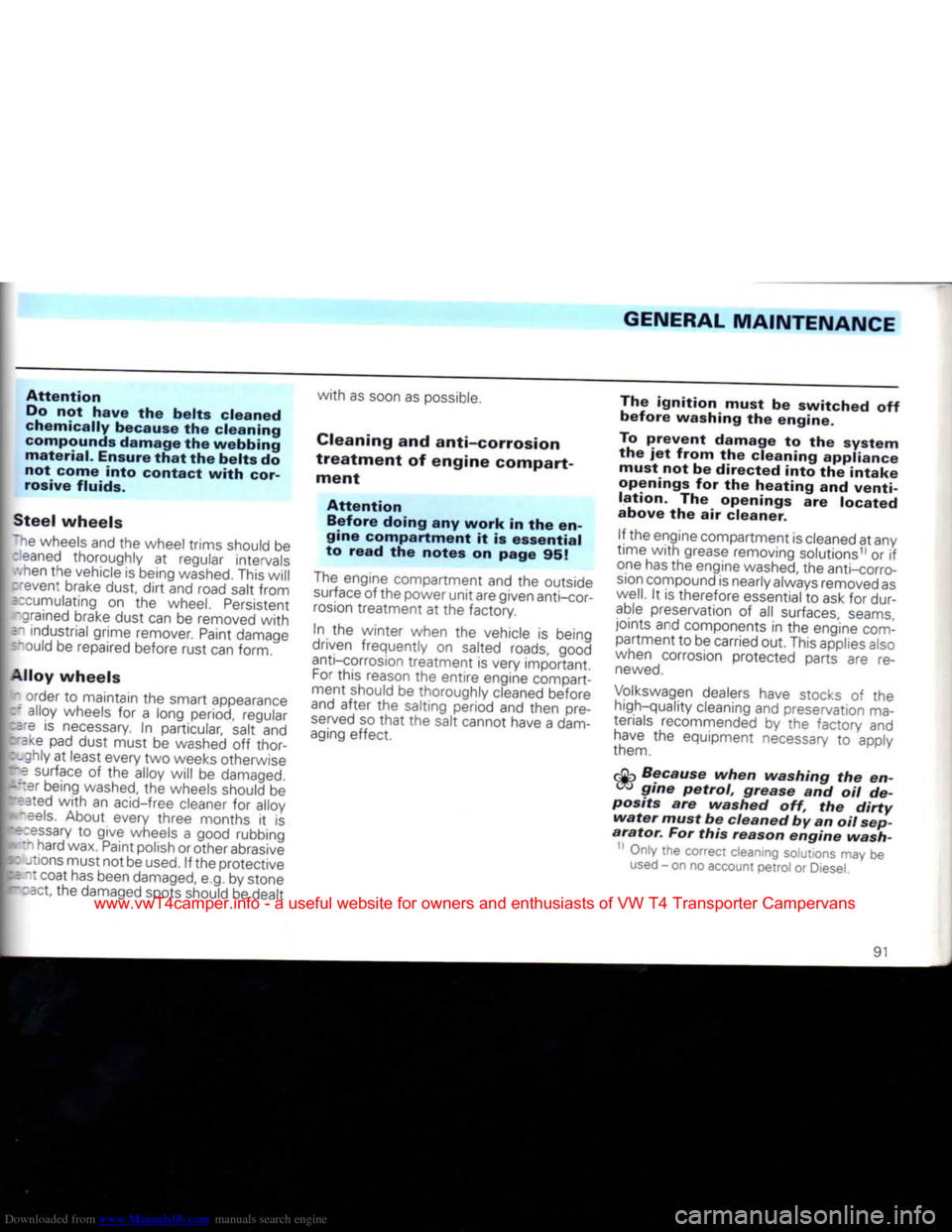
Downloaded from www.Manualslib.com manuals search engine
GENERAL
MAINTENANCE
Attention
Do
not have the belts cleaned
chemically
because the cleaning
compounds
damage the webbing
material. Ensure
that
the belts do not come into contact
with
cor
rosive
fluids.
Steel wheels
~ne wheels and
the
wheel trims should
be
:!eaned
thoroughly
at
regular intervals .'.hen the vehicle
is
being washed. This
will
"event brake dust,
dirt
and road salt
from
•cumulating
on the
wheel. Persistent "grained brake dust can
be
removed
with
="
industrial grime remover. Paint damage ;~ould
be
repaired before rust can form.
Alloy wheels - order
to
maintain
the
smart appearance
• alloy wheels
for a
long period, regular pre
is
necessary.
In
particular, salt
and
•Bke
pad dust must
be
washed
off
thor-
cghly
at
least every two weeks otherwise re surface
of the
alloy
will
be
damaged.
-~er
being washed,
the
wheels should
be
~f3ted
with
an
acid-free cleaner
for
alloy
"eels.
About every three months
it is
"f:essary
to
give wheels
a
good rubbing
». :n hard wax. Paint polish or other abrasive
•c
„tions must not be
used.
If
the protective
BE
-.t
coat has been damaged, e.g. by stone react,
the
damaged spots should be dealt
with
as soon
as
possible.
Cleaning and anti-corrosion
treatment
of
engine compart ment
Attention Before doing any
work
in the en
gine compartment it is essential
to read the notes on page 95!
The
engine compartment and
the
outside
surface
of
the power
unit
are given anti-cor
rosion treatment
at the
factory.
In
the
winter when
the
vehicle
is
being
driven frequently
on
salted roads, good
anti-corrosion treatment
is
very important.
For
this reason
the
entire engine compart
ment should
be
thoroughly cleaned before
and after
the
salting period
and
then pre
served
so
that
the
salt cannot have
a
dam
aging effect. The
ignition must be switched off
before washing the engine.
To
prevent damage to the system
the jet from the cleaning appliance must not be directed into the
intake
openings
for the heating and ventilation. The openings are located
above the air cleaner.
If
the engine compartment is cleaned
at
any
time
with
grease removing solutions1'
or if
one has the engine washed, the anti-corro
sion
compound is nearly always removed as
well.
It is
therefore essential
to
ask
for
dur
able
preservation
of all
surfaces,
seams,
joints
and components
in the
engine com partment
to
be carried out. This applies also
when corrosion protected parts
are re
newed.
Volkswagen
dealers have stocks
of the
high-quality cleaning and preservation ma
terials recommended
by the
factory
and
have
the
equipment necessary
to
apply
them.
Because
when
washing
the en
gine
petrol,
grease
and oil de
posits
are
washed
off, the
dirty
water
must
be
cleaned
by an oil
sep
arator.
For
this
reason
engine
wash-
11
Only
the
correct
cleaning
solutions may
be
used
-
on no account petrol
or
Diesel.
91
www.vwT4camper.info - a useful website for owners and enthusiasts of VW T4 Transporter Campervans
Page 95 of 164

Downloaded from www.Manualslib.com manuals search engine
GENERAL
MAINTENANCE
Maintenance
-s
the
vehicle
is
fitted
with
modern
low
~aintenance
technical components only
small
amount
of
regular servicing
is re
tired
in
order
to
maintain
the
roadworthi-
"sss,
economy and reliability.
~ne Inspection Service offered by the Vol ks-
I
agen dealers takes into account
to a
large
extent
the
individual annual mileage
cov-
e-ed and helps thus
to
keep
the
operating
:osts
as
low as possible.
Regular maintenance helps to
-J
ensure
that
the emissions - and
thus the environmental burden are
kept
as low as possible.
The
Inspection
Service
is
required
every
12
months
or
every
30 000 km,
. nichever occurs
first.
I
a mileage
of
15 000
km
(petrol engines)
or
"500
km
(Diesel engines)
is
reached before "2 months
has
elapsed,
the Oil
change
Service must
be
carried out. See page
98
5
so and
the
Service Schedule.
~ie Service Schedule also shows what »rk
is
done
at the
Inspection
and Oil
Inange
Services.
In
arduous
operating
conditions, e.g.
extremely low ambient temperatures, very
dusty conditions etc. certain service oper
ations should be carried
out
between the in
tervals specified.
This
applies
in
particular
to:
• Changing
the
engine
oil
• Cleaning
or
changing
the air
cleaner
el
ement
• Draining water from
or
renewing the fuel
filter
on the
Diesel engine
The
service operations should be carried out by
a
Volkswagen dealer because this work
requires specialist knowledge, workshop
equipment and special tools. Furthermore
this work must
be
done
in
accordance
with
out instructions.
Complete
proof
of
servicing
by a
Volks
wagen dealer can be one
of
the stipulations
for
the
upholding
of any
warranty claims during
the
one year warranty period.
Attention
Safety
regulations
place
very
strict
limits
on the
amount
of re
pairs
and
adjustments
to
engine
and
running
gear
parts
which
can
be
done
by the
owner.
By
tinker
ing
with
parts
which affect
the
safety
of a
motor
vehicle
one can
endanger
oneself
and
other road users.
Altering the engine settings is detrimental to the
exhaust
emissions.
This means
that
the envi
ronment is burdened unnecessarily
and the
fuel
consumption
also
in
creases.
The disposal of old oil, used brake
fluid,
dirty
coolant, defective
bat
teries or worn-out tyres etc. must be
done according to environmental
protection regulations. It is even
better
if old operating fluids and parts are used
again
and
do not become a burden on the envi
ronment. Through "recycling" valu
able
raw-materials and
energy
are
saved and at the same
time
it re lieves the load on the toxic waste
dumps.
Volkswagen dealers collect
all reusable materials and parts and
passes
them
on to the correct
agency
for recycling.
www.vwT4camper.info - a useful website for owners and enthusiasts of VW T4 Transporter Campervans
Page 97 of 164

Downloaded from www.Manualslib.com manuals search engine
GENERAL
MAINTENANCE
Engine
compartment
Page
Windscreen
washer
container
.. 108
Power
assisted
steering
fluid
reservoir*
100
Engine
oil filler
opening
97
Engine
oil
dipstick
97
Coolant
expansion
tank 102
Brake
fluid
reservoir
104
Battery
106 Attention
Particular care should be
taken
when working in the engine
com
partment!
•
Switch off engine, remove ignition key.
•
Pull handbrake on firmly.
•
Move gear lever into neutral or
"P"
position.
•
Allow engine to cool off.
•
As long as the engine is at op
erating temperature:
-
Do not put your hand into the radiator fan, it could switch on
suddenly.
-
Do not open the radiator cap be
cause
the cooling system is
under
pressure.
•
Avoid causing short circuits in
the electrical system - particular ly at the
battery
-.
•
If tests have to be
carried
out
with
the engine running,
there
is
an additional danger
present
from rotating parts - e.g.
V-belts,
generator, radiator fan etc. - and
from the high voltage ignition
system.
Attention must be paid to the warnings given in this Instruc
tion Manual and to the generally
applicable
safety regulations.
When topping up fluids one
should
ensure
that
they are not mistaken,
one
for the other, under any
circum
stances,
otherwise serious
func
tional defects
will
result.
So
that
leaks
are quickly de
tected
the ground underneath
the vehicle should be checked
reg
ularly.
If spots as caused by oil or
other
operating fluids can be seen, the vehicle should be
taken
to the
workshop for checking.
www.vwT4camper.info - a useful website for owners and enthusiasts of VW T4 Transporter Campervans